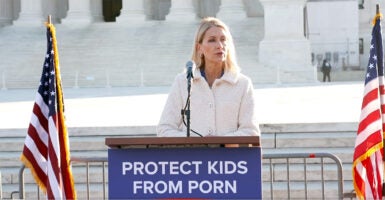Taylor Muthoka was first exposed to pornography at the age of 7. A friend showed it to her online, and all the children had to do to access the website was check a box saying they were 18. Little did she know that moment would lead to a 10-year addiction.
“That one moment of exposure stole my innocence, and it stole my childhood, with no barriers in place, no meaningful age verification,” Muthoka said. “I was exposed to violent and disturbing content that no one should ever see, especially not a child.”
The now-wife and mother and founder of FreedomHub, a nonprofit dedicated to ending human trafficking, braved freezing temperatures Wednesday to speak at the Supreme Court, urging it to declare a Texas law requiring age-verification to access porn websites constitutional.
In Free Speech Coalition v. Paxton, the high court will decide whether the age-verification law violates free speech rights.
Muthoka joined other advocates of child-protection legislation outside the court, including American Principles Project President Terry Schilling; Rep. Mary Miller, R-Ill.; and Louisiana state Rep. Lori Schlegel.
“This isn’t a conservative versus a liberal thing,” Schilling said of the Texas law. “This isn’t a Republican versus Democrat thing. Age verification might be the most bipartisan policy in the country right now.”
Miller, founder of the Congressional Family Caucus, introduced the SCREEN (Shielding Children’s Retinas from Egregious Exposure on the Net) Act to require all commercial pornography websites to adopt age-verification technology.
“I am a strong supporter of the First Amendment, and I’m appreciative of the right to speak today in front of the Supreme Court,” Miller said, “but the First Amendment does not give predatory companies the right to produce obscene content that can be accessed by minor children.”
Websites for alcohol and tobacco require age verification, and “obscene materials” online should be treated the same way, Miller said.
“Protecting children online certainly qualifies as a compelling government interest,” the congresswoman said, “and age-verification laws provide the least restrictive means to do so.”
Schlegel introduced and passed the nation’s first age-verification law for online porn in 2022, which inspired 18 other states, including Texas, to implement similar legislation.
“The states are stepping up to protect their kids, and we as a country are finally addressing an issue we’ve neglected for far too long,” Schlegel said. “It’s time to revisit this problem with the benefit of modern technology and a better understanding of the harm being done.”































One Reply to “‘It Stole My Childhood’: Supreme Court Urged to Protect Kids From Online Porn”